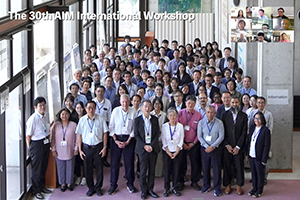The 30th AIM International Workshop
Information
- Date:
- August 28 - 29, 2024
- Place:
- At Ohyama Memorial Hall, National Institute for Environmental Studies, 305-8506, Tsukuba, Japan and online
- Document:
- Agenda (PDF/147KB)
Photo
The 30th AIM International Workshop
Poster Session Award
- 1st
-
Mr. Yohan Choi (Univ. of Seoul)
Rethinking the Economic Impact of Future Energy Demand Changes: Focus on Human Thermal Comfort - 2nd
-
Dr. Annuri Rossita (NIES)
Socioeconomic Impacts from Shifting to Sustainable Food Consumption towards Indonesia's Net Zero Emission
Agenda
DAY 1: August 28, 2024 (Wednesday)
| 10:00 of JST | Open Zoom Account and Registration |
| Session1: Opening Chairperson: Dr. Toshihiko Masui (NIES) |
|
| 10:30-10:35 | Opening Remarks Dr. Masahide Kimoto (NIES) |
| 10:35-10:40 | Opening Remarks Mr. Yoshinori Suga (MOEJ) |
| 10:40-11:00 | Activities in FY 2023-2024 Dr. Toshihiko Masui (NIES) |
| 11:00-11:20 | Keynote Speech: Potential Energy and CO2 Emissions Impacts of Naturally Occurring, Abundant, Geologic Hydrogen Dr. James Edmonds (PNNL) |
| 11:20-11:40 | Keynote Speech: Can We Go to 1.5℃ Pathways Globally Dr. Kejun Jiang (ERI) |
-Photo session-
-Lunch Break-
| Session 2: GHG mitigations in Asia (1) Chairperson: Dr. Tatsuya Hanaoka (NIES) |
|
| 13:30-13:45 | India Towards Net Zero: Issues and Challenges Prof. Manmohan Kapshe (MANIT) |
| 13:45-14:00 | Integrated Assessment Model in China: progress and prospect Prof. Hancheng Dai (Peking Univ.) and Prof. Yang Xie (BUAA) |
| 14:00-14:15 | Energy and Economy-wide Implications of Transport Sector Electrification in Nepal Prof. Ram Manohar Shrestha (AITM), Dr. Salony Rajbhandari (NIES) and Dr. Bijay B. Pradhan (Thammasat Univ.) |
| 14:15-14:30 | Integration of Computable General Equilibrium Model with Power Sector Optimization Models for Net-Zero Scenario Analyses Prof. Yong-Gun Kim, Prof. Tae-Yong Jung (Yonsei Univ.), Prof. Dong-Kun Lee (SNU) and Prof. Chan Park (Univ. of Seoul) |
| 14:30-14:45 | Evaluating Taiwan's Optimal Power Supply Mix in 2050 Dr. Yi-Hua Wu (National Applied Research Laboratories) |
| 14:45-15:00 | Discussion |
-Break-
| Session 3: GHG mitigations in Asia (2) Chairperson: Dr. Tung Lam Nguyen (VNPI) |
|
| 15:30-15:40 | Introduction of LoCARNet Activities Ms. Tomoko Ishikawa and Dr. Mikiko Kainuma (IGES) |
| 15:40-15:55 | Thailand NDC 3.0 Increasing Ambition of the Next Generation NDCs Prof. Bundit Limmeechokchai, Dr. Pornphimol Winyuchakrit, Dr. Piti Pita, Ds. Pemika Misila (Thammasat Univ.), Dr. Salony Rajbhandari and Dr. Achiraya Chaichaloempreecha (NIES) |
| 15:55-16:10 | Allocating FOLU Net Sink Target to Sub-national Prof. Rizaldi Boer (IPB) and Dr. Rositta Annuri (NIES) |
| 16:10-16:25 | Indonesia NZE 2060 of Energy Sector Prof. Retno Gumilang Dewi (ITB) |
| 16:25-16:40 | AIM Modelling Application at National to Local Level Planning and Decision Making Process: The Case of Malaysia Prof. Chin Siong Ho (UTM) |
| 16:40-17:00 | Discussion |
-Break-
| Session 4: Poster Session and Reception | |
| 17:10-19:30 | Poster Session and Reception |
DAY 2: August 29, 2024 (Thursday)
| 9:30 of JST | Open Zoom Account and Registration |
| Session 5: Climate impact, adaptation, and sustainability Chairperson: Dr. Kiyoshi Takahashi (NIES) |
|
| 10:00-10:15 | Subnational Modeling of U.S. Agriculture and Biofuels Dr. Ronald Sands (USDA) |
| 10:15-10:30 | AFOLU Relevant AIM Global Model's Activities Prof. Tomoko Hasegawa (Ritsumeikan Univ.) and Dr. Kazuaki Tsuchiya (NIES) |
| 10:30-10:45 | Developing an Integrated Assessment Model to Explore Optimal Cost-Benefit Paths for Shared Socioeconomic Pathways Scenarios Dr. Xuanming Su (JAMSTEC) |
| 10:45-11:00 | Inspecting Climate Justice for Urban Adaptation Planning in Korea Dr. Yoonjung Kim, Dr. Huicheul Jung (KEI) and Prof. Dongkun Lee (SNU) |
| 11:00-11:15 | Projection of Impacts on Ambulance Transport System and Economic Burden under Extremely High Temperatures Induced by Climate Change Dr. Kazutaka Oka (NIES) |
| 11:15-11:40 | Discussion |
-Lunch Break-
| Session 6: GHG Mitigation in Japan Chairperson: Dr. Toshihiko Masui (NIES) |
|
| 13:00-13:15 | Introduction of This Session and CGE analysis Dr. Toshihiko Masui (NIES) |
| 13:15-13:30 | Japan’s GHG Net-zero Scenario Using AIM/Enduse[1.0] Mr. Go Hibino (NIES) and Mr. Tomoki Hirayama (MHRT) |
| 13:30-13:45 | Power Supply and Demand for Decarbonized Society:
Development of AIM/MOGPM (Multi-regional Optimal Generation Planning Model) Dr. Shuichi Ashina (NIES) |
| 13:45-14:00 | From National Decarbonization Scenario to Regional Decarbonization Scenario Dr. Yuko Kanamori and Dr. Kei Gomi (NIES) |
| 14:00-14:20 | Discussion |
-Break-
| Session 7: Global analyses of GHG Mitigation Chairperson: Dr. Tatsuya Hanaoka (NIES) |
|
| 14:40-14:55 | Global Modelling for Simultaneous Achievement of “Deep Decarbonization”, “Air Quality Improvement”, and “Nitrogen Waste Reduction” Dr. Tatsuya Hanaoka and Dr. Silva Herran Diego (NIES) |
| 14:55-15:10 | Updates on AIM Global Modeling and Relevant International Activities Prof. Shinichiro Fujimori and Prof. Ken Oshiro (Kyoto Univ.) |
| 15:10-15:25 | IAMC SWG on National Scenarios Current Status Prof. Saritha Sudharmma Vishwanathan (Kyoto Univ.) |
| 15:25-15:40 | Discussion |
-Break-
| Session 8: Toward the Next 30 Years Chairperson: Dr. Silva Herran Diego (NIES) |
|
| 16:00-16:20 |
Necessary Next Steps Toward the Next 30 Years (Mitigation) Toward the Next 30 Years: Impact and Adaptation Studies in AIM |
| 16:20-17:30 | Discussion on Research Proposal toward the Next 30 Years |
| Session 8: Closing Chairpersons: Dr. Silva Herran Diego (NIES) |
|
| 17:30-17:40 | Poster Award Ceremony Dr. Junya Takakura (NIES) |
| 17:40-18:00 | Closing Remarks Dr. Mikiko Kainuma (IGES and NIES) |



